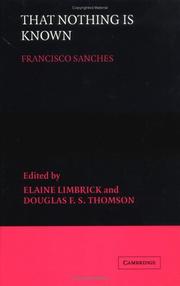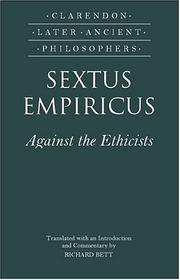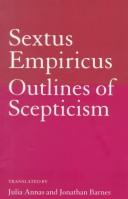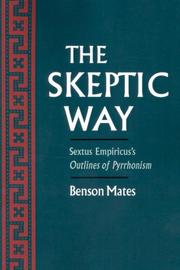| Listing 1 - 7 of 7 |
Sort by
|

ISBN: 0521350778 9780521350778 9780521069526 0521069521 Year: 1988 Publisher: Cambridge Cambridge University press
Abstract | Keywords | Export | Availability | Bookmark
 Loading...
Loading...Choose an application
- Reference Manager
- EndNote
- RefWorks (Direct export to RefWorks)
Book
ISBN: 8870883507 9788870883503 Year: 1995 Volume: 24 Publisher: Naples : Bibliopolis (Edizioni di filosofia e scienze),
Abstract | Keywords | Export | Availability | Bookmark
 Loading...
Loading...Choose an application
- Reference Manager
- EndNote
- RefWorks (Direct export to RefWorks)
Skepticism --- Scepticisme --- Early works to 1800 --- Ouvrages avant 1800 --- Sextus, --- Ethics --- Ethics - Early works to 1800. --- Skepticism - Early works to 1800.

ISBN: 0198250975 0198236204 9780198250975 Year: 1997 Publisher: Oxford : Clarendon Press,
Abstract | Keywords | Export | Availability | Bookmark
 Loading...
Loading...Choose an application
- Reference Manager
- EndNote
- RefWorks (Direct export to RefWorks)
Sextus Empiricus is one of the most important ancient philosophical writers after Plato and Aristotle. His writings are our main source for the doctrines and arguments of Scepticism. He probably lived in the second century AD. Eleven books of his writings have survived, covering logic, physics, ethics, and numerous more specialized fields. About Against the Ethicists: In this unjustly neglected and misunderstood work Sextus sets out a distinctive Sceptic position in ethics. He discusses the concepts good and bad, and puts forward the sceptical argument that nothing is either good or bad by nature or intrinsically or invariably, but only relatively to persons and/or to circumstances. He then argues that the sceptic is better off than the non-sceptic. In the latter part of the book, Sextus attacks the Stoic view that there is such a thing as a 'skill for life'. About this edition: This volume contains a translation of Against the Ethicists into clear modern English, together with an introduction and a detailed commentary. Those who have discussed this work in the past have tended to underestimate it, often regarding its main position as essentially the same as that of Sextus' better-known Outlines of Pyrrhonism. Richard Bett shows that Against the Ethicists represents a quite distinct and coherent philosophical outlook, associated with a phase of Scepticism earlier than Sextus himself, an outlook of which little other evidence survives
Ethics --- Skepticism --- Early works to 1800 --- Sextus, --- Ethics - Early works to 1800 --- Skepticism - Early works to 1800 --- Sextus, - Empiricus. - Pros ethikous

ISBN: 052131206X 0521309506 9780521309509 Year: 1994 Publisher: Cambridge : Cambridge University Press,
Abstract | Keywords | Export | Availability | Bookmark
 Loading...
Loading...Choose an application
- Reference Manager
- EndNote
- RefWorks (Direct export to RefWorks)
Skepticism --- Skeptics (Greek philosophy) --- Scepticisme --- Sceptiques (Philosophie grecque) --- Early works to 1800. --- Ouvrages avant 1800 --- -Scepticism --- Unbelief --- Agnosticism --- Belief and doubt --- Free thought --- Early works to 1800 --- -Early works to 1800 --- Skepticism - Early works to 1800

ISBN: 0195092120 0195092139 9780195092134 Year: 1996 Publisher: New York : Oxford University Press,
Abstract | Keywords | Export | Availability | Bookmark
 Loading...
Loading...Choose an application
- Reference Manager
- EndNote
- RefWorks (Direct export to RefWorks)
Skepticism --- Skeptics (Greek philosophy) --- Scepticisme --- Sceptiques (Philosophie grecque) --- Early works to 1800 --- Ouvrages avant 1800 --- Early works to 1800. --- -Scepticism --- Unbelief --- Agnosticism --- Belief and doubt --- Free thought --- #A9702W --- -Early works to 1800 --- Skepticism - Early works to 1800.
Book
ISBN: 0803241682 9780803241688 Year: 1986 Publisher: Lincoln University of Nebraska Press
Abstract | Keywords | Export | Availability | Bookmark
 Loading...
Loading...Choose an application
- Reference Manager
- EndNote
- RefWorks (Direct export to RefWorks)
Music theory --- Music, Greek and Roman --- Skepticism --- History and criticism --- -Skepticism --- Scepticism --- Unbelief --- Agnosticism --- Belief and doubt --- Free thought --- Greek music --- Music, Greek (Ancient) --- Music, Roman --- Roman music --- Music --- Musical theory --- Theory of music --- Theory --- Music theory - Early works to 1800 --- Music, Greek and Roman - History and criticism - Early works to 1800 --- Skepticism - Early works to 1800
Book
ISBN: 9780197266595 0197266592 Year: 2020 Publisher: Oxford Oxford University Press
Abstract | Keywords | Export | Availability | Bookmark
 Loading...
Loading...Choose an application
- Reference Manager
- EndNote
- RefWorks (Direct export to RefWorks)
Robert Greystones on Certainty and Skepticism: Selections from His Works is a continuation of the volume previously published by Auctores Britannici Medii Aevi, Robert Greystones on the Freedom of the Will: Selections from His Commentary on the Sentences (edited by Mark O Henninger, with Robert Andrews and Jennifer Ottman, 2017). In the course of preparation of the first volume, startling information arose concerning the nature and extent of Greystones' skepticism. Following draft editions of a number of Greystones' Sentences commentary questions, the most relevant five questions were selected for editing and translation. Greystones is in the tradition of Nicholas of Autrecourt, William Crathorn, Monachus Niger (the Black Monk), Nicholas Aston, and John Went, but the earliest of these figures. Building upon the 69th proposition of the Condemnation of 1277, Greystones concludes that God's unlimited power must lead to a radical skepticism about human knowledge. We cannot be certain whether we are in this life or the afterlife, in a body or not. We cannot be certain about the existence of any external object. We have no certain knowledge of cause and effect, the existence of substances, or of any contingent event. Like Descartes, Greystones held that we can be certain about our own existence (ego sum). But preempting Descartes' appeal to a beneficent, non-deceptive God, Greystones says: God does not deceive. But you deceive yourself if you insist on believing that something exists when you know that it might not! You know that God can intervene at any instant, and thus that you can never completely trust your senses. Greystones' skepticism is strikingly significant in light of the later historical development of philosophy.
Certainty --- Certainty. --- Knowledge, Theory of --- Knowledge, Theory of. --- Philosophy, Medieval. --- Skepticism --- Skepticism. --- Skeptizismus. --- History --- Robertus, --- Greystones, Robert, --- To 1500. --- Skepticism - Early works to 1800 --- Certainty - Early works to 1800 --- Knowledge, Theory of - Early works to 1800 --- Philosophy, Medieval --- Skepticism - History - To 1500 --- Robertus de Graystanes ca. um 1336 --- Greystones, Robert, - approximately 1289-1334
| Listing 1 - 7 of 7 |
Sort by
|

 Search
Search Feedback
Feedback About UniCat
About UniCat  Help
Help News
News